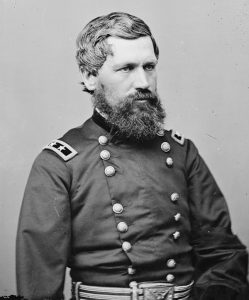On the Road to Atlanta: Howard at Pickett’s Mill

The stress of combat at Pickett’s Mill on May 27th led to a clash of angry emotions:
Shortly after Gibson’s brigade became engaged, General Oliver O. Howard suffered a minor wound. “A shell after striking the ground to my left,” he wrote, “threw the fragments in different directions. One of these struck my left foot as I was walking forward.” Howard, already short an arm, admitted that “for the instant I believed I had lost my leg.” Adjutant Alexis Cope of the 15th Ohio witnessed the incident, recalling that Howard covered his eyes with his “armless sleeve” and “exclaimed, ‘I am afraid to look down! I am afraid to look down!’” In fact, the fragment had only torn through the sole of his boot, severely bruising the bottom of his foot but doing no other damage. Bruised and rendered immobile, Howard spent the next several hours among the dead, the wounded, and those men who a later generation would describe as shell-shocked.[1]
Howard “sat among the maimed till after midnight,” his aides coming and going, carrying orders “reorganizing broken lines and building forts and lines of obstructions.” While there, the corps commander experienced the true horror of war: “Faint fires here and there revealing men wounded, armless, legless, or eyeless; some with heads bound up with cotton strips, some standing and walking nervously around, some sitting with bended forms, and some prone upon the earth—who can picture it? A few men, in despair, had resorted to drink for relief. The sad sounds from those in pain were mingled with the oaths of the drunken and the more heartless.” Howard, a devout Christian teetotaler, was appalled. Forty-four years after the fact he confessed “that night will always be a sort of nightmare to me. I think no perdition here or hereafter can be worse.”[2]
Captain George Lewis of Company B, the 124th Ohio recalled a more frustrating encounter with the general. While searching for the body of his friend Lt. Charles Steadman, killed earlier in the day, he remembered how “dead pine trees . . . had taken fire from the bursting shells and cast a weird and gloomy light over the battlefield. . . . I can never forget the terrible sounds that filled our ears. When the wounded men discovered that some one was there they began such piteous appeals for help. ‘For God’s sake can’t you give me a drop of water?’ ‘Can’t you help me off the field, so I may not be captured?’” While carrying Steadman’s body to the rear, Lewis stumbled into Howard and some of his staff. Angered and embittered by the waste and neglect of so many soldiers’ lives, Lewis blurted out that his regiment “had been driven off the battlefield, and that there was not so much as a union picket between our lines and the rebels.” Howard, perhaps as agitated as Lewis during this night of bitter defeat, snapped back: “there is not a word of truth in your story, sir. Go away from here, this is my headquarters.” The captain sullenly departed, “reflecting how it was possible for a man to be such a devout Christian and a corps commander, and still be so little a gentleman.”[3]
[1]Howard, Autobiography, I: 555; Cope, 15th Ohio, 452. Howard stated that he was afoot at the time, but Cope remembered the general still being mounted when wounded.
[2]Howard, Autobiography, I: 556.
[3]Lewis, Campaigns of the 124th, 154-155.
Nice post, Dave. I’m in metro Atlanta; but with absolute objectivity; Pickett’s Mill is one of the great battle sites in North America; it is(as you know) just about absolutely pristine.I can’t imagine it looked much different in 1864. It’s just the 180-degree polar opposite of a “Disney-fied” site like Gettysburg. No huge Cyclorama, no huge visitor center, no 1000+ monuments. I hope it never changes.
General Howard faced a difficult task- Cleburne’s Division entrenched on difficult ground. The state park preservation persuasively demonstrates the difficult terrain.